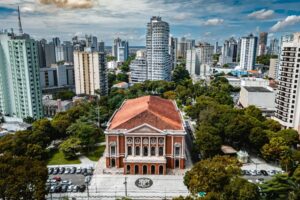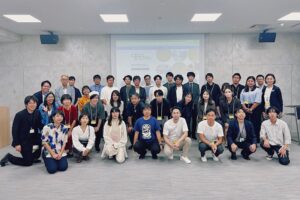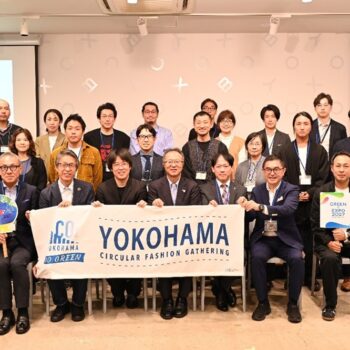![[Zenbird] Reframing what waste can be through the lens of Kanagawa Sustainability Tour (Report)](https://harch.jp/wp-content/uploads/2025/11/zenbird_tour-report_202511-825x340.jpg)
[Zenbird] Reframing what waste can be through the lens of Kanagawa Sustainability Tour (Report)
- On Nov 18, 2025
- circular business, Circular Economy, Cross-cultural Learning, Environmental Initiatives, Kanagawa, Local Industry, Singapore Government, Site Visit, Sustainability Tour, Sustainable Practices, upcycling, Waste Management, Zenbird
Harch, which operates Zenbird, hosted government officials from Singapore in a one-day circular economy tour in Kanagawa Prefecture on October 13, visiting several circular businesses in the region to observe their initiatives up close. This article reports on the tour and its outcomes.
*This article is a republished report from Zenbird titled “Reframing what waste can be through the lens of Kanagawa Sustainability Tour (Report)“.
*This article is a republished report from Zenbird titled “Reframing what waste can be through the lens of Kanagawa Sustainability Tour (Report)”.
With Yokohama City’s commitment to strengthen its efforts to create a circular economy in the region, the tour featured a few of the most notable circular businesses in the prefecture.
Tsurumi Recycling Center

Tsurumi Recycling Center was our first stop for the day. The staff of Tsurumi Recycling Center welcomed the visitors on arrival at the facility, and began with an overview of Yokohama’s waste management system, then explained the role Tsurumi Recycling Center plays in that system. Participants learnt what the basic blocks of the facility were, and what were expected of the citizens in managing household waste.
Next, the staff led a tour of the facility, with up-close looks at the sections that recover resources. The bustle of trucks delivering collected waste from various parts of the city gave life to the centre, as everyone got to learn the intricacies of the centre’s work. It was a demonstration of Japanese efficiency in waste management.

Further discussion highlighted the importance of environmental education. Educating children about separation of garbage builds a culture of consideration for objects, where the relationship between user and object is not use-and-forget, but one of mindfulness.

KITCHEN MANE
Japan Food Ecology Center
After a hearty lunch at KITCHEN MANE, a restaurant that promotes ethical eating, our next stop was Japan Food Ecology Center, a facility closing the loop on food waste. Here we got to learn about the issues across the food system, from waste to supplying healthy feed for pig farms.

It was a stark reminder of the environmental and financial toll of food waste, and how valuable it can be! JFEC masterfully turns the food waste into fermented liquid feed, while using technology to track the product content and flow of resources through its supply chain. They also convert what they can’t use into energy at their neighbouring Sagamihara Biogas Power Plant.

With this, JFEC is promoting self-sufficiency with their Cascade Recycling initiative. On one hand, they are providing healthy feed that is cost-competitive and alleviates the reliance on imported feed. On the other, they are generating renewable energy that serves as an additional source of energy, especially in times of emergencies.
AQUPONI
Next, we made our way to AQUPONI’s farm at Fujisawa, where the participants saw the company’s circular farming methods up close. Coupling aquaculture with hydroponic plant beds allows AQUPONI to farm with minimal environmental impact. We were given an introduction to different aspects of AQUPONI’s services, like their leverage on IoT, the use of both freshwater and seawater, and their overseas ventures.

Participants also toured the on-site facilities and saw potential beyond farming, such as employment for people with disabilities and opportunities for tourism. AQUPONI’s business model not only offers solutions to tackle climate crisis risks, but also benefits society.
In fact, we also learnt that AQUPONI provide support and opportunities for others to expand circular farming adoption, from home aquaponics kits to rental programmes for interested players.

Waste is not just a resource, waste is profitable
When is waste, not waste? Often, we hear that waste is a resource, but the tour showed the difference between merely recognising it and actually treating it as one. Turning that resource into something meaningful, financially sustainable and eco-friendly is the true mark of circularity. Waste becomes profitable and ceases to be waste.
And history agrees. This has been the case for Japan more than 400 years ago in the Edo Period. Edo period Japan was limited in its resources, so people not only innovated to maximise the longevity and lifecycles of materials, but also built an economy on circular businesses.
Take candle wax, for example. Wax was an expensive commodity that the rich could afford in the Edo Period, and candle makers made exquisitely designed pieces for sale. But because they were so expensive, collectors visited homes to gather used wax and sold it to candle artisans. his was one of many circular businesses in the Edo period, as resources were funnelled back into the supply chain..
This is similar to today’s models of recycling centres and manufacturers, where municipalities collect and sort reusable materials to sell to manufacturers. And through this tour, we see how there are other forms of innovations that rediscover the profitability of “waste”.
Circularity takes effort, but it is the way forward for the modern world
Even though we witnessed the realised potential of the circular economy, it is not a magic trick that appears at a snap of the fingers. It draws on many ingredients.
Creating a circular business requires the inspiration, clear vision and the will to commit. Partnerships and influence are essential in building rapport between partners and stakeholders. Sometimes it requires public-private-academic partnership, sometimes it requires buy-in from citizens.
And the circular businesses that we have visited demonstrate how waste can become a profitable resource with the right business model. These Japanese companies show benefits for society and the environment; we hope they serve as examplars for our participants.
*Image: Rina Muroi
[Reference page] Reframing what waste can be through the lens of Kanagawa Sustainability Tour (Report) | Zenbird
[Related site] Zenbird





![[Circular Yokohama] Event Report | YOKOHAMA CIRCULAR FASHION GATHERING: Envisioning the future of textile circulation across industries](https://harch.jp/wp-content/uploads/2025/10/YOKOHAMA-CIRCULAR-FASHION-GATHERING-300x200.jpg)

